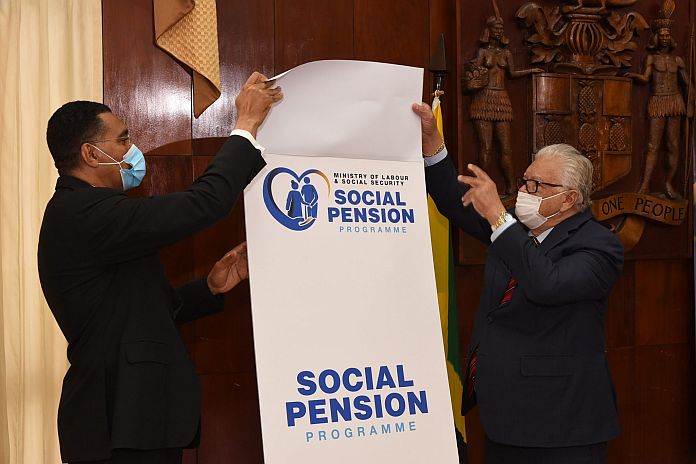By Alecia Smith
KINGSTON, Jamaica, (JIS) – Prime minister, Andrew Holness, on Friday, July 30, officially launched the government’s $800 million Social Pension Programme, which provides a guaranteed income for vulnerable persons 75 years and older.
Seniors targeted are those not currently in receipt of a pension, disability benefit or other retirement benefits, cash grants from the Programme of Advancement Through Health and Education (PATH), or Poor Relief Programme, and who do not reside in a government institutional care facility.
Holness said the programme, which is the first of its kind in Jamaica, is a landmark achievement in the development of the nation’s social protection framework for the most vulnerable in the society.
“I am particularly proud of the fact that we have been able to implement this programme in the midst of the coronavirus (COVID-19) pandemic. We have been able to do this because of prudent fiscal management on the part of this government,” he said during a ceremony held virtually from Jamaica House.
The prime minister noted that apart from the COVID-19 Allocation of Resources for Employees (CARE) programme, and the Social and Economic Recovery (SERVE) programme, which are pandemic related, the new Social Pension Programme is the largest social protection initiative to be implemented by the Government since the introduction of PATH 20 years ago.
“PATH would have been recognised, particularly within this region as a model programme for the social safety net. Now, with our new Social Pension Programme, we are creating another layer of social protection which we expect will become a model for the rest of the region,” the prime minister noted that there are many elderly persons in need of financial support, who do not qualify for existing social welfare initiatives.
He noted that the implementation of this programme for needy seniors is therefore crucial given the government’s moral and social obligation to guarantee a minimum level of social protection for all citizens.
“The introduction of the new Social Pension Programme will enable us to reduce income inequality and promote a better quality of life for Jamaica’s older population, recognising that many of these persons often have (little) or no community support,” he said, adding that some have no family, savings, or investments.
In addition, Holness noted that with only 47 percent of the employed labour force actively contributing to the National Insurance Scheme (NIS) which is a compulsory contributory-funded social security scheme covering all employed persons in Jamaica, it means that less than half of the population aged 65 years and over would be in receipt of a pension.
“So, you have a large part of our retired population that is not covered by NIS,” the prime minister explained, that the Social Pension Programme differs from the NIS as it is a non-contributory scheme, which means that it does not require former contributions from an individual.
“It is a stream of payments from the government to an individual. So, this is coming from the taxpayers’ resources, and we are giving a cash transfer to enable a minimum level of income to our vulnerable citizens,” he explained.
Minister of labour and social security, Karl Samuda, in his remarks, informed that just over 2,000 payments have been made to seniors under the programme since July 22.
“Next month, we are hoping that that will increase to between about 8,000 and 10,000 and so on and it will expand so we will have that mass reach.
“We are expecting that early next year, we would have, through this effort, “cleaned up” the PATH list so that we know exactly how many recipients are there, we know exactly how to project the funding necessary and from there, we would then begin to establish even better programmes that will reach out to the poor and the needy,” he said. Eligible seniors on PATH who have reached the age of 75, will be transitioned to the Social Pension Programme.





